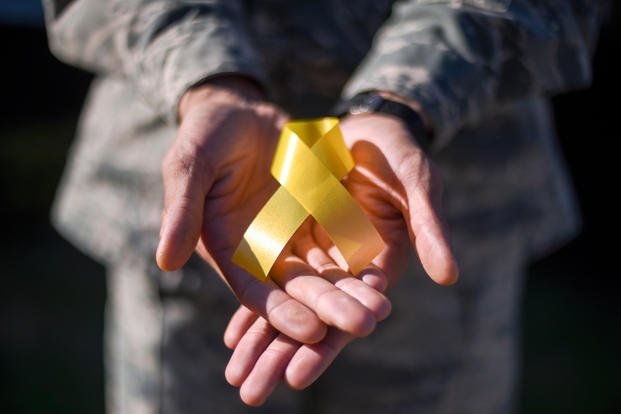Karen Guenther, a former ICU nurse, is the president, CEO and founder of Semper Fi & America's Fund. Since 2004, the fund has provided immediate financial assistance and lifetime support for veterans during their time of recovery and transition back into civilian life.
Lives will unfortunately be lost.
As the head of a nonprofit providing lifetime support to service members, suicide is a grim reality that my counterparts and I face every day. Around the holidays, there is an unfortunate uptick in untimely deaths. This will likely be exacerbated by COVID-19 -- not just for veterans but for civilians as well.
A societal pandemic in its own right, suicide is incredibly complex. Certainly, there are a number of successful treatment and prevention programs being implemented, but there is much we still have to learn about mental illness. That is why in this perpetual but urgent battle to save lives, we need to fundamentally rethink how we approach and respond to suicide. It starts with a look inward to an incredibly simple and powerful tool that is too often overlooked -- our own hearts.
The statistics are startling. By most benchmarks, suicide rates are trending in the wrong direction. Already the 10th leading cause of death in the United States, suicide rates in the U.S. have risen 35% since 1999. With respect to the military, the Department of Veterans Affairs estimates that suicide claims the lives of approximately 17 U.S. veterans each day. According to published reports, military suicides rose 20% this spring compared to the same time last year, coinciding with the onset of COVID-19.
The solution is multifaceted. A major challenge in tackling suicide prevention is that there are many mental health conditions -- depression, PTSD, bipolar disorders and anxiety -- that can contribute to suicidal thoughts. Having worked as an ICU nurse for 20 years in hospitals across the country, I have found that the only effective way to administer care to those who have been critically wounded in battle is through a holistic approach.
One of the first things I learned in nursing school is that to truly care for a person is to ensure that they are sound on all levels -- physically, mentally, emotionally and spiritually. To accomplish that, we cannot underestimate the importance of working on diet, rest, exercise, sleep and also faith. Taken together, all of these things help make us more resilient to face life's inevitable challenges. In addition, we know that we need to ensure people have a sense of human connection, purpose and direction in their lives. These basic lessons lay at the foundation of the work being done by numerous organizations across the country that help the combat wounded and their families.
Throughout my many years serving veterans and their families, I have seen groups put incredible programs into action to give people purpose and hope.
Such programs include the Tragedy Assistance Program for Survivors (TAPS), which sponsors grief camps for children who have lost a military loved one; Resounding Joy, which provides therapy through music; and Mission BBQ, which feeds our troops and their mission of patriotism, to name just a few. I've also witnessed how lives are changed by veterans bonding with their comrades over a campfire at a weekend retreat or apprenticeship programs that help vets secure capital and equipment needed to start a business. These are the kinds of tried-and-true programs that we know work.
But there are countless brave men and women not yet plugged into larger communities who have yet to find a support network. Reaching them is crucial in the race to save lives.
Circumstances and lack of knowledge can be obstacles to accessing helpful resources. Service-related physical or mental conditions can increase loneliness, isolation, fear and despair. Simply not knowing where to turn for help causes thousands of veterans to suffer alone. Many of the hurting are living and working right next to us. He or she could be the neighbor next door, your Uber driver, a passenger on a bus, a parishioner at church, or even closer yet, a family member. Herein lie the call and opportunity for all of us.
As Americans, we must do more to give hope and purpose to those feeling alone and hopeless. Just as our communities have rallied countless times to help those in great need, we must do so even more now.
While national programs serve an incredible purpose, hope is always local. All it may take is a simple smile, holding the door or a quick hello to someone who might not be looking or acting like themselves. These "pay it forward" moments undoubtedly come from one place -- the heart. According to the motto of Cardinal John Henry Newman -- inspired by Saint Francis de Sales -- the "Heart speaks to the heart."
The holidays are supposed to be a joyous time spent with family and friends. For many veterans, this is not the case. Collectively, we need to go out of our way to let our service members and veterans know they are not alone. The gift of help and hope lies within each of us. Simple, human, heart-to-heart connection can make a life-changing difference for those most at risk. As the late Holocaust survivor, psychiatrist and author Victor E. Frankl once said so eloquently, "Those who have a 'why' to live can bear with almost any 'how.'"
This holiday season, connect with the service members and veterans in your circle. Share the gift of time, hope, love and purpose. It could change your life -- and theirs.
-- The opinions expressed in this op-ed are those of the author and do not necessarily reflect the views of Military.com. If you would like to submit your own commentary, please send your article to opinions@military.com for consideration.















